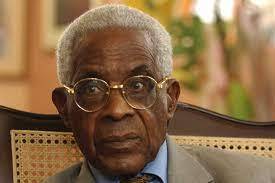
Chronicle of a fervent defender of African culture: Aimé Césaire
What would we be without the heroes of old who dedicated their lives to the liberation of the
African continent of Western domination?
If it is true that becoming is a return to the beginning, then we must celebrate these past heroes
which made possible the emancipation of African culture.
Among these illustrious figures, figure Aimé Césaire, writer and politician, at the
poet, playwright, essayist and biographer.
Born on June 26, 1913 in Basse Pointe, he is the founding father of Negritude with personalities
renowned such as Léopold Sédar Senghor, the Paulette sisters and Jean Nardal.
Aimé Césaire arrived in Paris in September 1931 as a scholarship holder for higher education,
met several people including Ousmane Socé Diop at the Sorbonne and Léopold
Sédar Senghor in the corridors of the Lycée Louis-le-Grand.
He began to rub shoulders with black students from various backgrounds, frequented the literary salon of
Paulette Nardal, and later discovers the Harlem Renaissance movement. The young person
Aimé Césaire and his Guyanese friend Léon Gontran Damas gradually discover a part
repressed from their identity, the African component, victim of the cultural alienation characterizing
the colonial societies of Martinique and French Guiana.
Thus, in 1934, Césaire founded with other Caribbean-Guyanese and African students.
among them the Guyanese Léon Gontran Damas, the Guadeloupean Guy Tirolien, and the
Senegalese Léopold Sédar Senghor and Birago Diop, the newspaper L’Etudiant Noir. It’s in the
pages of this magazine that will appear for the first time the term “negritude” two years later.
This concept created by Aimé Césaire following the oppression, the cultural subjugation of the system
French colonial aims to reject on the one hand the French project of cultural assimilation and
promote Africa and its culture, devalued by racism stemming from colonialist ideology.
Built against the French colonial ideology of the time, the project of “negritude” is more
cultural as well as political. It is, beyond a partisan and racial vision of the world, a
active and concrete humanism, aimed at all the oppressed of the planet. Césaire declares in
effect: “I am of the race of those who are oppressed”.
Césaire’s vision being to liberate all those who are alienated by a culture other than their own,
even nearly a century later, more than ever his fight is topical.
While it is true that Africa gained independence after years of struggle against the
colonization, it is clear that the independence enjoyed by Africa today is only
politics (are we really independent?) because the situation in Africa today is as it is
of a continent plagued by deep cultural alienation. Yet culture is the
base, the pillar on which any civilization must be based because as Milan Kundera said “The
culture is the memory of the people, the collective consciousness of historical continuity, the mode
to think and live.”


Post a comment